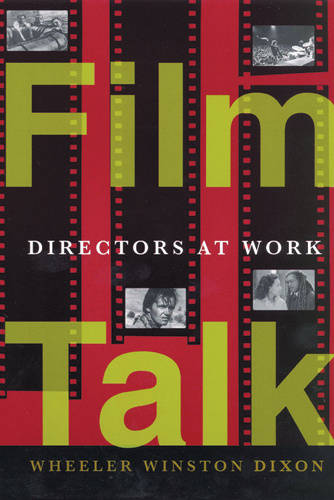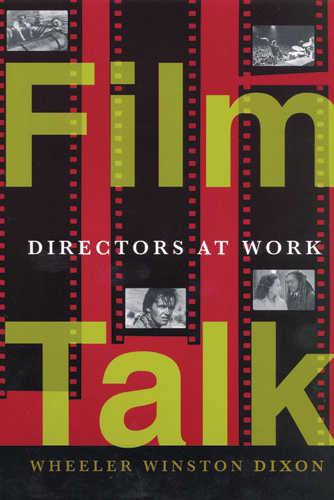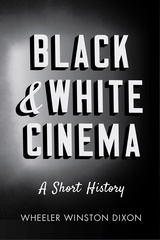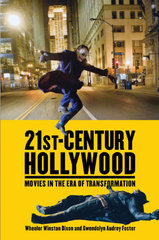What 1970s Hollywood filmmaker influenced Quentin Tarantino? How have contemporary Japanese horror films inspired Takashi Shimizu, director of the huge box office hit The Grudge? What is it like to be an African American director in the twenty-first century?
The answers to these questions, along with many more little-known facts and insights, can be found in Film Talk, an in-depth, behind-the-scenes look at filmmaking from the 1940s to the present. In eleven intimate and revealing interviews, contemporary film directors speak frankly about their work-their successes and their disappointments, their personal aspirations, struggles, relationships, and the politics that affect the industry.
A medley of directors including those working in pop culture and documentary, as well as feminist filmmakers, social satirists, and Hollywood mavericks recount stories that have never before been published. Among them are Monte Hellman, the auteur of the minimalist masterpiece Two-Lane Blacktop; Albert Maysles, who with his late brother David, created some of the most important documentaries of the 1960s, including Salesman and The Beatles: What's Happening?; Robert Downey Sr., whose social satires Putney Swope and Greaser's Palace paved the way for a generation of filmmakers; Bennett Miller, whose film Capote won an Academy Award in 2005; and Jamie Babbit, a lesbian crossover director whose low-budget film But I'm a Cheerleader! became a mainstream hit.
The candid conversations, complimented by more than fifty photographs, including many that are rare, make this book essential reading for aspiring moviemakers, film scholars, and everyone interested in the how movies are made and who the fascinating individuals are who make them.
The answers to these questions, along with many more little-known facts and insights, can be found in Film Talk, an in-depth, behind-the-scenes look at filmmaking from the 1940s to the present. In eleven intimate and revealing interviews, contemporary film directors speak frankly about their work-their successes and their disappointments, their personal aspirations, struggles, relationships, and the politics that affect the industry.
A medley of directors including those working in pop culture and documentary, as well as feminist filmmakers, social satirists, and Hollywood mavericks recount stories that have never before been published. Among them are Monte Hellman, the auteur of the minimalist masterpiece Two-Lane Blacktop; Albert Maysles, who with his late brother David, created some of the most important documentaries of the 1960s, including Salesman and The Beatles: What's Happening?; Robert Downey Sr., whose social satires Putney Swope and Greaser's Palace paved the way for a generation of filmmakers; Bennett Miller, whose film Capote won an Academy Award in 2005; and Jamie Babbit, a lesbian crossover director whose low-budget film But I'm a Cheerleader! became a mainstream hit.
The candid conversations, complimented by more than fifty photographs, including many that are rare, make this book essential reading for aspiring moviemakers, film scholars, and everyone interested in the how movies are made and who the fascinating individuals are who make them.
This delightful selection of interviews with important directors who have made significant contributions to film ranges from the 'old-timers' to the up-and-coming. In addition to gossipy bits of information, Dixon reveals the myriad ways people make theirway into the movie business and the ways that geniuses conceptualize their primary goal as director.
This delightful selection of interviews with important directors who have made significant contributions to film ranges from the 'old-timers' to the up-and-coming. In addition to gossipy bits of information, Dixon reveals the myriad ways people make theirway into the movie business and the ways that geniuses conceptualize their primary goal as director.
Wheeler Winston Dixon is the James Ryan Endowed Professor of Film Studies, Professor of English at the University of Nebraska, Lincoln, and the coeditor-in-chief of the Quarterly Review of Film and Video. His films have been acquired for the permanent collection of the Museum of Modern Art in New York. He is the author of numerous books including American Cinema of the 1940s and Visions of Paradise (both Rutgers University Press).
The old masters
Ronald Neame (The horse's mouth, Tunes of glory, I could go on singing, The Poseidon adventure)
Val Guest (The Quatermass xperiment, Expresso bongo, Casino Royale)
Budd Boetticher (Buchanan rides alone, The killer is loose, Arruza)
Albert Maysles (Gimme shelter, Salesman, What's happening!, The Beatles in the U.S.A.)
Cult visions
Jack Hill (The big doll house, Coffy, Foxy Brown, Switchblade sisters)
Monte Hellman (The shooting, Two-lane blacktop)
Robert Downey, Sr. (Putney swope, Greaser's palace)
New voices
Takashi Shimizu (The grudge, The grudge 2)
Jamie Babbit (But I'm a cheerleader)
Bennett Miller (Capote)
Kasi Lemmons (Eve's Bayou)
Ronald Neame (The horse's mouth, Tunes of glory, I could go on singing, The Poseidon adventure)
Val Guest (The Quatermass xperiment, Expresso bongo, Casino Royale)
Budd Boetticher (Buchanan rides alone, The killer is loose, Arruza)
Albert Maysles (Gimme shelter, Salesman, What's happening!, The Beatles in the U.S.A.)
Cult visions
Jack Hill (The big doll house, Coffy, Foxy Brown, Switchblade sisters)
Monte Hellman (The shooting, Two-lane blacktop)
Robert Downey, Sr. (Putney swope, Greaser's palace)
New voices
Takashi Shimizu (The grudge, The grudge 2)
Jamie Babbit (But I'm a cheerleader)
Bennett Miller (Capote)
Kasi Lemmons (Eve's Bayou)








